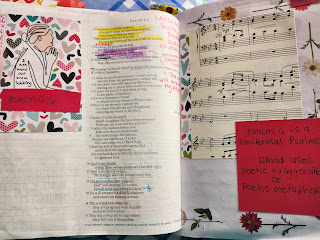Mary Magdalene Lesson #6
Hello beautiful sisters!! I hope that you are having an amazing week so far. Today I want to tell you about a new way to study a Bible Verse - and I will demonstrate below.
Since we are studying the women of the Bible, I thought it only apt to make a W.O.M.E.N. study! Please see the template below!
Since we will be spending the rest of the month discussing Mary's part in the crucifixion and resurrection, today we will continue to use Luke 8:2.
W: "and also some women who had been cured of evil spirits and diseases: Mary (called Magdalene) from whom seven demons had come out;"
O: What do I observe from this scripture that may pertain to my life directly? Well, they may not be literal demons, but I think we all can be filled with bad thoughts, depression, bad habits, anxiety, worry, etc. Our very own "demons". Jesus can help us with all of these things. We have to trust as Mary M trusted Him and put our "demons" in His hands.
M: Memorize and/or Meditate. When I say meditate, I am referring to taking a scripture during your quiet time and rolling it around in your mind. Think deeply about it and see if God has anything to say to you.
As for memorization - there are many ways to do this. I am sharing some techniques from Bible Gateway (I LOVE this website btw)
Ten Tips for Memorizing Bible Verses
1. Choose a verse to memorize that speaks to something in your life right now.
A Bible verse that’s relevant to what you’re going through is easier to memorize than one that speaks to a topic that’s abstract to you.
2. Start small.
Choose a short verse to start with… and make it even shorter by breaking it down into pieces. Memorize the first five words in the verse first, and when you’ve got them down, add the next five. As you become more confident, you can add more words, sentences, and even entire verses—but don’t add anything new until you’ve got the previous words down pat.
3. Write it down.
A vast majority of Bible Gateway fans suggested this simple strategy: write the verse you’re memorizing down on paper. But don’t just write it once; write it many times—five or ten times is a good start (and some people write out their memory verses up to 50 times!). Physically writing the words out is an extremely useful tactile memory aid.
4. Say it out loud.
Just as writing a verse out can help in memorizing it, so speaking the words aloud is an excellent way to burn them into your memory. One person suggested turning the radio off during your commute to work or school each day and reciting your memory verse out loud instead!
5. Incorporate the verse into your prayers.
When you pray, include elements of the verse in your words to God. Pray that God will help you understand and apply the verse to your life. Pray for God’s help in fixing the verse in your heart and mind.
6. Put it everywhere.
Many people suggested writing your memory verse out on multiple index cards or sticky notes (combine this with tip #3 above!) and putting them all over the place, so that you’ll see the verse many times throughout your day. Tape the verse to your bathroom mirror or computer monitor. Tuck it into your purse, lunch sack, car glove compartment, school textbook, pockets… anywhere you’ll see it. One person suggested making the verse your computer desktop background, and another goes so far as to laminate the verse and hang it in the shower!
7. Use music to help.
Do you find it much easier to remember lyrics than spoken words? Try setting the Bible verse to a simple tune (perhaps repurposing a song you already know well) that you can sing to yourself. (If this sounds like a strange suggestion, consider that many famous hymns and worship songs use Bible verses as their lyrics, and were written specifically as aids for Bible verse memorization.)
8. Make it a game.
Turn the act of memorizing into a personal challenge! You might write the verse out on flashcards, leaving key words blank, and quiz yourself. Get some friends or family members to help quiz you, or even to memorize the verse along with you and encourage/challenge you.
9. Translate the verse into a different language.
This tip isn’t for everyone, obviously, but several Bible Gateway fans suggested that if you’re comfortable in more than one language, try translating your verse into a different language. Translation requires an intense focus on the meaning and language of a verse—an obvious help for memorization.
10. Repeat, repeat, repeat!
Whatever strategy you follow in memorizing a Bible verse, do it repeatedly. Write it down, speak it out loud, sing it out, pray it—but whatever you do, do it over and over until it’s a natural, reflexive action. The goal isn’t to reduce it to a mindless, repeated activity, but to slowly press the verse into your memory through repetition. Repeat your memorization activity over the course of several hours, days, or even weeks to pace yourself—there’s no prize for memorizing a Bible verse fastest; the point is to internalize it over time. And that means you shouldn’t be discouraged if it takes a while for the verse to “stick”—keep at it, and it will take root!
If you’ve never tried memorizing a Bible verse before, it’s much easier than you think! Pick one or two of the strategies above and give them a try, adapting your strategy as you figure out what does and doesn’t work for you. One thing is certain: you’ll never regret spending more time focusing intently on God’s Word. And there’s nothing quite so wonderful as an encouraging Bible verse springing forth from memory at just the time you need to hear it.
E: Educate. This is my FAVORITE part! As I mentioned above, I love Bible Gateway. I have recently subscribed to get access to all of their study resources and I am obsessed.
Let's look at the scripture again:
"and also some women who had been cured of evil spirits and diseases: Mary (called Magdalene) from whom seven demons had come out;"
LUKE—NOTE ON 8:1–3 Luke has more references to the role of women in Jesus’ ministry than any other Gospel. Here he mentions several by name. The women come from many social levels. See 23:49; 24:1–11; Acts 1:14.
Jesus healed Mary of demonic possession, and she gratefully followed him to the foot of the cross and the empty tomb (Matt. 27:56, 61; 28:1; and parallels). Seven demons reveals the greatness of her healing.
8.2–3 Although women in general had fewer resources than men, some were wealthy, and some scholars estimate that a tenth of all patrons in antiquity were women. Women benefactors were normally acceptable (cf. 2 Kings 4.8–10), but enemies sometimes used one’s support by such benefactors as a grounds for criticism.
The present Mary is distinguished from all others of the same name as “The Magdalene,” which identifies her with her place of birth, just as Jesus was called “The Nazarene” because of His association with Nazareth. Magdala means “tower” or “castle,” and in the time of Christ was a thriving, populous town on the coast of Galilee about three miles from Capernaum. Dye works and primitive textile factories added to the wealth of the community. It may be that “The Magdalene” was connected with the industry of the town for it would seem as if she was not without means, enabling her to serve the Lord with her substance.
Family Connections—We have no record of Mary’s parentage, her marital status or her age. That she was free to follow Jesus in His journeyings would suggest that she had no home obligations.
N: Notes. I am a notetaker. A Bible journaler. I love digging deeper into a Scripture and worship through creativity. Below are some examples of pages I've worked on. I am obviously NOT an artist!
I hope this gives you some incite into how to use the WOMEN acronym to study Scripture! Please let me know if you have any questions or ideas!
Blessings,
Sherry









Comments
Post a Comment